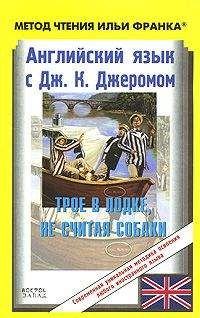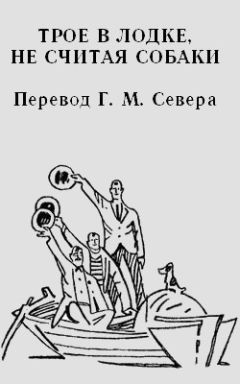Jerome Jerome - Английский язык с Джеромом К. Джеромом. Трое в лодке, не считая собаки
gunwale [ɡʌnl] plough [plau]
As my advice was by far the easiest to follow, we ended by adopting it, and contrived to embrace the gunwale and give her her head.
The boat travelled up stream for about a mile at a pace I have never sailed at since, and don't want to again. Then, at a bend, she heeled over till half her sail was under water. Then she righted herself by a miracle and flew for a long low bank of soft mud.
That mud-bank saved us. The boat ploughed its way into the middle of it and then stuck. Finding that we were once more able to move according to our ideas, instead of being pitched and thrown about like peas in a bladder, we crept forward, and cut down the sail.
We had had enough sailing (мы довольно поплавали под парусом). We did not want to overdo the thing and get a surfeit of it (не хотели переборщить с этим и пресытиться им; surfeit — излишество, избыток; пресыщение). We had had a sail — a good all-round exciting, interesting sail (у нас был парус = мы совершили поездку под парусом — приятную, разностороннюю, захватывающую, интересную поездку) — and now we thought we would have a row, just for a change like (и теперь мы решили погрести, просто для разнообразия).
We took the sculls and tried to push the boat off the mud (мы взяли весла и попытались столкнуть лодку с ила = с отмели), and, in doing so, we broke one of the sculls (и при этом: «делая так» сломали одно из весел; to break). After that we proceeded with great caution, but they were a wretched old pair (затем мы продолжили с большой осторожностью, но они /весла/ были жалкой старой парой), and the second one cracked almost easier than the first, and left us helpless (и второе весло раскололось едва ли не легче, чем первое, и оставило нас беспомощными).
The mud stretched out for about a hundred yards in front of us, and behind us was the water (отмель тянулась примерно на сотню ярдов перед нами, а позади нас была вода). The only thing to be done was to sit and wait until someone came by (единственное, что оставалось делать — сидеть и ждать, пока кто-нибудь не проплывет мимо).
surfeit [ˈsǝ:fɪt] caution [ˈkɔ:ʃ(ǝ)n] wretched [ˈreʧɪd]
We had had enough sailing. We did not want to overdo the thing and get a surfeit of it. We had had a sail — a good all-round exciting, interesting sail — and now we thought we would have a row, just for a change like.
We took the sculls and tried to push the boat off the mud, and, in doing so, we broke one of the sculls. After that we proceeded with great caution, but they were a wretched old pair, and the second one cracked almost easier than the first, and left us helpless.
The mud stretched out for about a hundred yards in front of us, and behind us was the water. The only thing to be done was to sit and wait until someone came by.
It was not the sort of day to attract people out on the river (день не был таким, чтобы привлечь людей на реку), and it was three hours before a soul came in sight (и прошло три часа, прежде чем человек появился в поле зрения; soul — дух, душа; лицо, человек). It was an old fisherman who, with immense difficulty, at last rescued us (это был старый рыбак, который с огромным трудом наконец освободил нас; difficulty — трудность, препятствие, труд; to rescue — спасать, избавлять, выручать), and we were towed back in an ignominious fashion to the boat-yard (и мы были отбуксированы обратно позорным образом к лодочной мастерской).
What between tipping the man who had brought us home (что касается вознаграждения человеку, который доставил нас домой; to tip — наклонять/ся/; опрокидывать; давать «на чай»), and paying for the broken sculls (и платы за сломанные весла), and for having been out four hours and a half (и за прокат лодки в течение четырех с половиной часов), it cost us a pretty considerable number of weeks' pocket-money, that sail (это стоило нам изрядного количества недельных карманных денег = карманных денег на много недель вперед, это плавание). But we learned experience, and they say that is always cheap at any price (но мы приобрели опыт, а он, как говорят, всегда дешевый при любой цене = за него ничего не жалко).
immense [ɪˈmens] ignominious [,ɪɡnǝˈmɪnɪǝs]
It was not the sort of day to attract people out on the river, and it was three hours before a soul came in sight. It was an old fisherman who, with immense difficulty, at last rescued us, and we were towed back in an ignominious fashion to the boat-yard.
What between tipping the man who had brought us home, and paying for the broken sculls, and for having been out four hours and a half, it cost us a pretty considerable number of weeks' pocket-money, that sail. But we learned experience, and they say that is always cheap at any price.
CHAPTER XVI
(глава шестнадцатая)
Reading (Рэдинг). — We are towed by steam launch (нас тащит на буксире паровой баркас). — Irritating behaviour of small boats (раздражающее поведение маленьких лодок). — How they get in the way of steam launches (как они мешают паровым баркасам; to get in the way — мешать, стоять на пути, поперек дороги). — George and Harris again shirk their work (Джордж и Гаррис снова уклоняются от своей работы). — Rather a hackneyed story (довольно банальная история). — Streatley and Goring (Стритли и Горинг).
Reading. — We are towed by steam launch. — Irritating behaviour of small boats. — How they get in the way of steam launches. — George and Harris again shirk their work. — Rather a hackneyed story. — Streatley and Goring.
WE came in sight of Reading about eleven (мы увидели Рэдинг около одиннадцати). The river is dirty and dismal here (река здесь грязная и унылая). One does not linger in the neighbourhood of Reading (люди не задерживаются в окрестностях Рэдинга; in the neighbourhood of — по соседству с, поблизости от; около). The town itself is a famous old place, dating from the dim days of King Ethelred (сам городок — знаменитое старинное местечко, ведущее свое начало от смутных дней короля Этельреда), when the Danes anchored their warships in the Kennet (когда датчане бросили якоря своих военных кораблей в Кеннете), and started from Reading to ravage all the land of Wessex (и отправлялись из Рэдинга опустошать все земли Уэссекса; to ravage — губить, разорять; опустошать); and here Ethelred and his brother Alfred fought and defeated them (и здесь Этельред и его брат Альфред сразились с ними и разбили их; to fight), Ethelred doing the praying and Alfred the fighting (Этельред — молясь: «совершая моление», а Альфред — сражаясь).
launch [lɔ:nʧ] dismal [ˈdɪzm(ǝ)l]
WE came in sight of Reading about eleven. The river is dirty and dismal here. One does not linger in the neighbourhood of Reading. The town itself is a famous old place, dating from the dim days of King Ethelred, when the Danes anchored their warships in the Kennet, and started from Reading to ravage all the land of Wessex; and here Ethelred and his brother Alfred fought and defeated them, Ethelred doing the praying and Alfred the fighting.
In later years, Reading seems to have been regarded as a handy place to run down to (в более поздние годы на Рэдинг, видимо, смотрели как на удобное местечко, /куда/ можно убежать; to run down — сбегать, спускаться вниз /о местности/; съездить из Лондона в провинцию), when matters were becoming unpleasant in London (когда дела в Лондоне становились неприятными). Parliament generally rushed off to Reading whenever there was a plague on at Westminster (парламент обычно устремлялся в Рэдинг всякий раз, когда в Вестминстере случалась чума); and, in 1625, the Law followed suit, and all the courts were held at Reading (в 1625 суд последовал /его/ примеру, и все судебные заседания проводились в Рэдинге; law — закон, юриспруденция; суд, судебный процесс; to hold — держать). It must have been worth while having a mere ordinary plague now and then in London (должно быть, оно того стоило — иметь время от времени всего лишь обычную чуму в Лондоне) to get rid of both the lawyers and the Parliament (избавиться и от юристов, и от парламента).
During the Parliamentary struggle, Reading was besieged by the Earl of Essex (во время борьбы парламента /с королем/ Рэдинг был осажден графом Эссекским), and, a quarter of a century later, the Prince of Orange routed King James's troops there (и четверть века спустя принц Оранский разбил здесь войска короля Якова; to rout — разбивать наголову; обращать в беспорядочное бегство).
Henry I. lies buried at Reading, in the Benedictine abbey founded by him there, the ruins of which may still be seen (Генрих Первый похоронен в Рэдинге, в Бенедиктинском аббатстве, основанном им, развалины которого можно по-прежнему видеть); and, in this same abbey, great John of Gaunt was married to the Lady Blanche (в этом же самом аббатстве великий Джон Гонт обвенчался с леди Бланш; gaunt — изможденный; длинный, тощий).
Parliament [ˈpɑ:lǝmǝnt] plague [pleɪɡ] besieged [bɪˈsi:ʤd]
In later years, Reading seems to have been regarded as a handy place to run down to, when matters were becoming unpleasant in London. Parliament generally rushed off to Reading whenever there was a plague on at Westminster; and, in 1625, the Law followed suit, and all the courts were held at Reading. It must have been worth while having a mere ordinary plague now and then in London to get rid of both the lawyers and the Parliament.
During the Parliamentary struggle, Reading was besieged by the Earl of Essex, and, a quarter of a century later, the Prince of Orange routed King James's troops there.
Henry I. lies buried at Reading, in the Benedictine abbey founded by him there, the ruins of which may still be seen; and, in this same abbey, great John of Gaunt was married to the Lady Blanche.
At Reading lock we came up with a steam launch, belonging to some friends of mine (у Рэдингского шлюза мы поравнялись с паровым баркасом, принадлежащим одним моим приятелям), and they towed us up to within about a mile of Streatley (и они буксировали нас до расстояния примерно в милю до Стритли = почти до Стритли). It is very delightful being towed up by a launch (очень приятно, когда вас тянет на буксире баркас). I prefer it myself to rowing (сам я предпочитаю это гребле). The run would have been more delightful still (поездка была бы еще приятнее; run — /за/бег; плавание, короткая поездка), if it had not been for a lot of wretched small boats (если бы не множество жалких маленьких лодочек) that were continually getting in the way of our launch (которые постоянно попадались на пути/мешали нашему баркасу), and, to avoid running down which, we had to be continually easing and stopping (и чтобы избежать потопления которых = чтобы не потопить их, нам приходилось все время замедлять ход и останавливаться; to run down — сбить, переехать; столкнуться; топить /в результате столкновения/). It is really most annoying, the manner in which these rowing boats get in the way of one's launch up the river (действительно очень раздражает манера, в которой эти гребные лодки мешают = привычка этих гребных лодок мешать движению парового баркаса на реке); something ought to be done to stop it (необходимо что-то сделать, чтобы остановить их).



